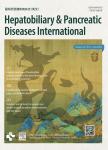Expression of the tumor suppressor gene maspin and its significance in intraductal papillary mucinous neoplasms of the pancreas
Expression of the tumor suppressor gene maspin and its significance in intraductal papillary mucinous neoplasms of the pancreas作者机构:Department of PathologyShowa University School of Medicine Department of Internal MedicineShowa University Toyosy Hospital Department of PathologyShowa University School of Medicine Department of PathologyShowa University School of Medicine Department of SurgeryShowa University School of Medicine Division of PathologyEbara HospitalTokyo Japan
出 版 物:《Hepatobiliary & Pancreatic Diseases International》 (国际肝胆胰疾病杂志(英文版))
年 卷 期:2008年第7卷第1期
页 面:86-90页
核心收录:
学科分类:1002[医学-临床医学] 100214[医学-肿瘤学] 10[医学]
主 题:maspin intraductal papillary mucinous neoplasm pancreas apoptosis immunohistochemistry
摘 要:BACKGROUND: Maspin is a member of the serpin family of protease inhibitors and is thought to inhibit carcinoma invasion, metastasis, and angiogenesis and induce apoptosis. We examined maspin expression immunohistochemically and assessed its significance in intraductal papillary mucinous neoplasm (IPMN) of the pancreas. METHODS: We examined 39 surgically resected specimens of IPMN that included 17 adenomas (IPMAs), 5 borderline tumors (IPMBs), 4 non-invasive carcinomas (non-invasive IPMCs), and 13 invasive carcinomas (invasive IPMCs). Immunostaining was performed according to the EnVision ChemMate method. The degree of maspin expression was scored and assessed according to the percentage and staining intensity of positive cells. RESULTS: Maspin expression was minimal in normal pancreatic duct epithelium, whereas in IPMNs, maspin was expressed in neoplasms of all stages. Maspin expression increased with increasing grade from IPMAs, IPMBs, to non-invasive IPMCs but decreased significantly in invasive IPMCs. No specific association between maspin expression and mucin type was found. Analysis of maspin expression with respect to clinicopathologic factors in cases of invasive IPMC revealed a greater extent of invasion in cases of low maspin expression and significantly fewer apoptotic cells in the ***: Maspin was expressed at high levels in IPMNs at various stages from adenoma to invasive carcinoma, and our results suggest that maspin may be involved in the occurrence and progression of IPMN. In addition, our data suggest that the apoptosis-inducing action of maspin suppresses invasion and progression of IPMN.



